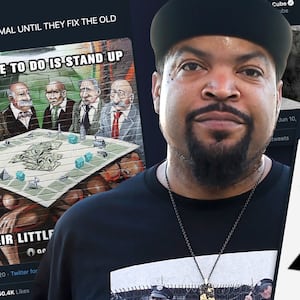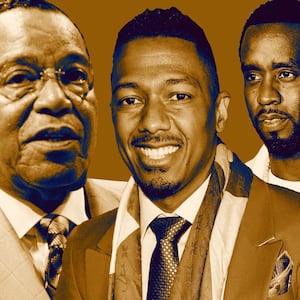Nick Cannon is ready to be back in the public’s good graces, but he’s not exactly looking for forgiveness. Rather, he says he’s going “beyond apologizing,” is seeking “growth,” and has taken the past nine months to reflect and learn after making a series of anti-Semitic remarks and pushing conspiracy theories about Jewish people.
After several meetings with the American Jewish Committee, the Anti-Defamation League, Jewish leaders, and rabbis, including those who have written glowing testimonies about his “sincere” dedication to educating himself, Cannon is ready to talk.
On Tuesday night, he opened up about his “journey of atonement” and stressed the importance of taking the time to understand why his words were hurtful to the Jewish community during his first network interview since the fallout, sitting down with ABC’s Linsey Davis for the network’s series Soul of a Nation.
Back in June, in a since-removed episode of his YouTube show Cannon’s Class, the comedian was chatting with guest Richard Griffin, best known as Professor Griff, who made a number of anti-Semitic remarks back in the ‘80s that led to him being booted from the legendary hip-hop group Public Enemy.
The entire premise of the conversation was appalling, including when Cannon floated a number of anti-Semitic conspiracy theories, saying, “we give so much power to the theys, and theys turn into illuminati, the Zionists, the Rothschilds”; suggesting that those who lack melanin are “savages” and “evil”; claiming that Jews had co-opted Judaism from Black people, who were “the true Hebrews”; and that Black people therefore “can’t be anti-Semitic.”
The backlash came swift. At first, Cannon seemed to try and defend himself by declaring he had “no hate in [his] heart nor malice intentions.” But he changed his tune when ViacomCBS, which Cannon had a decades-long relationship with, fired him as host and executive producer of the popular MTV show Wild ‘N Out. In a frank statement, the media company announced the news, saying it was “deeply troubled” by Cannon’s failure to acknowledge the harmful and hurtful nature of his comments.
Fox had also apparently toyed with the idea of axing Cannon, who hosts its popular reality-competition series The Masked Singer, but said after conversations with him that they saw he was “clear and remorseful that his words were wrong.”
After his termination from ViacomCBS, Cannon directly apologized to members of the Jewish community, saying it was never his intention to put them in “such a painful position” and committed to “daily efforts” to bring their two communities closer together.
But in a strange twist, Cannon also went after ViacomCBS, saying it was “on the wrong side of history” and “does not understand or respect the power of the Black community,” demanding full ownership of Wild ‘N Out, which he claims to have turned into a billion-dollar brand.
The timing of Cannon’s sit down with Davis comes a month after ViacomCBS and Cannon surprisingly smoothed things over. Despite its seemingly definitive statement and Cannon’s explosive rebuke of his one-time employer, he will return to his hosting duties on Wild ‘N Out. MTV Entertainment said Cannon had taken “responsibility for his comments” and “worked to educate himself.”
Cannon insisted to Davis that no one pressured him to apologize, because to him “apologies are empty. Apologies are weightless.”
“In Hebrew they call it, you know, ‘Teshuva,' the process of not only, you know, repenting, but through that, if you’re ever met with a similar situation that you make a different decision,” he explained. “That goes beyond apologizing. I’m on this journey of atonement not to get a job, not to gain any more money, because that’s not what’s needed here.”
“I’m doing this because it’s the right thing to do,” he added.
Davis touched on some of Cannon’s comments during the now infamous podcast where he claimed that people of African-American descent were the “true” Jews and therefore couldn’t be anti-Semitic, and seemed to suggest people without melanin were “closer to animals” and “savages.”
While Cannon walked back those thoughts and insisted that he absolutely doesn’t believe those of lighter skin are “evil” or “barbaric,” his only explanation as to why he said Black people were the “true” Hebrews was that “one thing that can’t be debated is that we all originated from Africa.”
“The purpose first was to say we are all the same,” he said. “That ultimately was what I was saying, I was like, ‘How can you hate when you believe that you come from the same people that are saying you’re being hateful?’”
Cannon said his comments were not made out of prejudice or hatred, but “definitely ignorance… and frustration,” and is now taking ownership of “leaning into” the hurt he’s caused.
Speaking to Rabbi Abraham Cooper, an associate dean at the influential Simon Wiesenthal Center who initially blasted Cannon over his comments—saying it qualified as a “PhD in Jew-hatred”—Cannon beseeched the rabbi to educate him. “I want to understand why I hurt you, what did I say, what are these tropes,” he asked.
As part of his learning, Cannon is now pursuing a master’s degree in divinity. While those programs are often taken by those seeking to go into ministry and theology, Cannon has no plans on being a pastor. “I sin too much,” he jokes. Still, it’s a sign that he’s dedicated to putting in the work.
“My journey’s not gonna stop, whether the person watching this forgives me or not,” Cannon added. “I’m still gonna, hopefully through this process, be on the right side of history and bring people closer together.”



